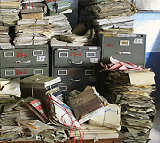 There has been some discussion here at Export Law Blog about the proper role of freight forwarding companies in export enforcement. If a customer of a freight forwarder proffers a package addressed to Iran without an OFAC license, should the freight forwarder decline the package and tell the customer that shipments to Iran must be licensed? Or should the freight forwarder accept the package and call the authorities? The recent settlement agreement entered into between Kuwaiti-owned Proclad International Pipelines and the Bureau of Industry and Security shows, I think, a freight forwarder that struck exactly the right balance.
There has been some discussion here at Export Law Blog about the proper role of freight forwarding companies in export enforcement. If a customer of a freight forwarder proffers a package addressed to Iran without an OFAC license, should the freight forwarder decline the package and tell the customer that shipments to Iran must be licensed? Or should the freight forwarder accept the package and call the authorities? The recent settlement agreement entered into between Kuwaiti-owned Proclad International Pipelines and the Bureau of Industry and Security shows, I think, a freight forwarder that struck exactly the right balance.
At issue were attempted exports by Proclad of nickel alloy pipes classified as EAR99 to Iran without a license. The company attempted to export the pipes to Iran by transshipping them through the UAE. In the recitation of the various counts with which Proclad was charged is this interesting language:
Proclad altered markings for use on the crates of nickel alloy pipes that it was attempting to export to Iran. The altered markings were provided to the U.s. manufacturers in lieu of markings previously provided indicating that pipes were being exported to Iran. Proclad altered the markings to conceal the true ultimate destination of the items after it had been informed by a freight forwarder of the applicable licensing requirements during a previous attempt to export the pipes to Iran.
What apparently happened was that once the freight forwarder said the pipes couldn’t be shipped to Iran, Proclad simply slapped on new labels saying that the pipes were going to the UAE. I suspect the freight forwarder then called the authorities.
The freight forwarder did the right thing by initially telling the exporter that exports to Iran required licenses. Clearly any exporter that hands documents to the freight forwarder showing Iran as the ultimate destination is clueless about U.S. law. Proclad Pipelines is located in Scotland, so it’s a reasonable assumption that they may not have been familiar with U.S. export restrictions.
But what initially might be seen as an innocent mistake quickly became an illegal undertaking when Proclad decided that the appropriate response wasn’t to decline to export items to Iran but to pretend to export the Iranian-bound goods elsewhere. And a freight forwarder who saw that a package previously bound for Iran now had on shipping labels for the UAE would have to be well-aware that the exporter was attempting some shenanigans. And that, in my view, fully-justified the freight forwarder ratting out Proclad.

 Posted by
Posted by  Category:
Category: 

 The Bureau of Industry and Security (“BIS”) recently
The Bureau of Industry and Security (“BIS”) recently  If any company considering its first export transaction actually read and tried to understand the recordkeeping requirements of
If any company considering its first export transaction actually read and tried to understand the recordkeeping requirements of  Almost a year after the last plenary of the
Almost a year after the last plenary of the  The Bureau of Industry and Security (“BIS”) recently
The Bureau of Industry and Security (“BIS”) recently 

